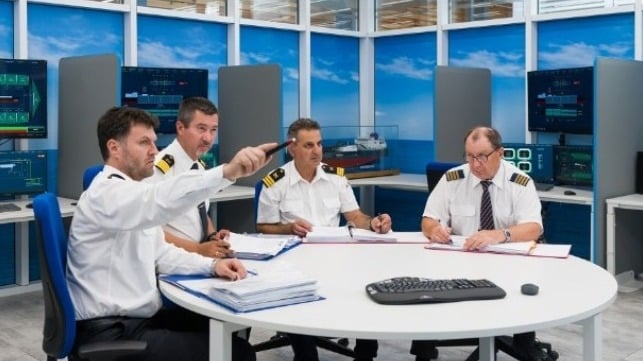BSM launches New Liquid Cargo Simulator Facility

Bernhard Schulte Shipmanagement (BSM), has launched a new Liquid Cargo training facility at its Maritime Training Centre in Cyprus. This, combined with a structured career progression model, will ensure BSM’s LNG crews are highly trained and competent to support its growing global LNG shipping operations. The new immersive environment is part of a wider boost to LNG training across the whole company, reflecting increasing industry demand and more LNG vessels entering the market.
The new Liquid Cargo Simulator (LCS) has been designed and developed by BSM’s inhouse technical team and uses GTT Training software. It offers realistic training on a wide range of vessel types: LNG fuelled ships and LNG gas carriers with a combination of cargo containment systems and different propulsion systems (including steam turbine, DFDE, DF 2-stroke diesel) with various options for LNG fuelled ship and LNG fuel supplier configurations.
LNG is currently the fastest growing natural energy source, favoured by many ship operators for being clean, versatile and widely available. Demand has increased enormously in recent years with a growing number of vessels being converted to LNG and significant orders for new LNG vessels placed with shipyards in Asia following the implementation of the IMO sulphur cap in January 2020.
BSM has also rolled out the GTT Training software to its Maritime Training Centres (MTC) in Mumbai, Manila and Poland. Crews in these locations will be able to complete the training in a classroom environment with the simulator displayed on screens.
However, the MTC in Cyprus is the very first to have a dedicated designed simulator room which offers a far more realistic and immersive experience, complimenting the existing training offered. It makes the centre which will be open to seafarers from other companies and organisations, a valuable gas training hub for the whole region and will benefit new LNG seafarers, many of whom are expected to come from Eastern Europe.
The LCS will be used to train seafarers to meet the requirements of the STCW (Standards of Training, Certification and Watchkeeping for Seafarers) Code and SIGTTO (Society of International Gas Tanker and Terminal Operators) as well as offering a range of bespoke in- house courses developed to a higher level of expertise (than STCW and SIGTTO) for the BSM managed fleet and its seafarers.
BSM will also offer Liquefied Cargo Operation training, approved by DNV-GL to satisfy the competency standards of SIGTTO (the Society of International Gas Tanker and Terminal Operators).
General Manager HR Marine, Andrew Hall said: “Bernhard Schulte Shipmanagement has over 45 years of experience in the management of gas carriers, and currently manages more than 100 gas carriers, all staffed by our highly trained specialised gas fleet teams.
“We are committed to our seafarer training at all levels, the new Liquid Cargo Simulator will ensure that the technical and operational expertise, the understanding of key processes and knowledge of management best practice, of our seafarers working onboard gas carriers and LNG fuelled ships is both industry leading and comprehensive.
“By only satisfying the minimum industry requirements we do not necessarily produce the best LNG crews, so we have added tailored development programmes to our range to ensure that we provide the best possible opportunities and to ensure we have highly competent seafarers onboard our LNG vessels.
The courses offered by the BSM Cyprus Maritime Training Centre include:
- Advanced Liquefied Gas Tanker Operations (STCW)
- Basic Liquefied Gas Tanker Operations (STCW)
- Advanced Training for Service on Ships subject to the IGF Code (STCW)
- Basic Training for Service on Ships subject to the IGF Code (STCW)
- LNG Tanker Operations Management Level (SIGTTO)
- Liquified Cargo Operations (non SIGTTO)
- A range of additional BSM and client specific training
The products and services herein described in this press release are not endorsed by The Maritime Executive.
